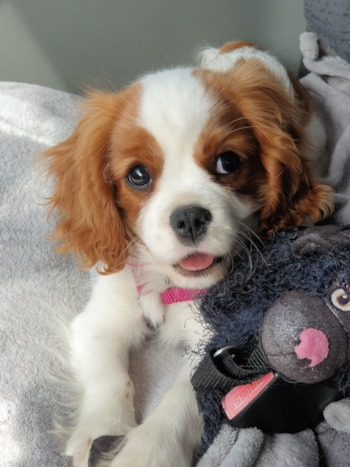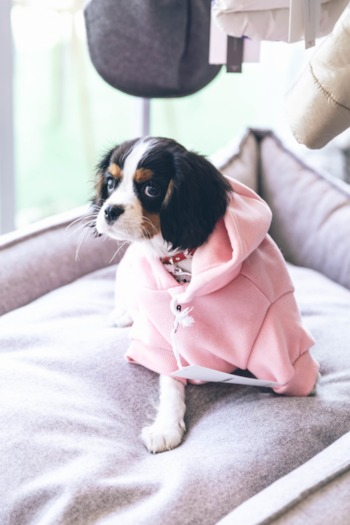

The Cavalier King Charles Spaniel is a delightful breed that's sure to win your heart with their affectionate nature and gentle demeanor. Known for their intelligence and social skills, these charming dogs are eager to please and form strong bonds with their families. With their silky coats and graceful presence, Cavaliers are not only a lovely addition to any household but also a loyal and loving companion for people of all ages.
Cavaliers are a versatile breed, adapting well to various living situations, from apartments to larger homes, as long as they have ample opportunities for play and exercise. Their friendly disposition makes them an ideal choice for families with children, as well as those seeking a companion for their golden years. Though they require regular grooming to maintain their luxurious coats, the effort is well worth it when you consider the joy and companionship they bring to your life.
Characteristics
- Affectionate Nature: Cavaliers are renowned for their loving and gentle temperament. They form strong bonds with their families and adore cuddling and giving affection, making them the perfect companion for those who value a close emotional connection with their pets.
- Sociable Disposition: These charming dogs are incredibly friendly and sociable, not only with their human family members but also with other dogs and even cats. Their easygoing nature makes them excellent playmates for children and a great fit for families of all sizes.
- Adaptable Lifestyle: Cavaliers are versatile and can adapt well to various living situations, whether it's a city apartment or a spacious suburban home. As long as they receive enough exercise, love, and attention, they'll be content in any environment.
- Moderate Exercise Needs: While Cavaliers enjoy regular walks and playtime, they are not overly energetic, making them well-suited for a wide range of owners, including seniors or those with a more sedentary lifestyle.
- Trainability: Cavalier King Charles Spaniels are intelligent and eager to please, which makes them highly trainable. They respond well to positive reinforcement techniques and can excel in advanced training or dog sports such as agility, rally, or obedience.
- Grooming Requirements: The breed's silky, medium-length coat requires regular brushing and occasional bathing to maintain its beauty and health. Additionally, attention should be given to their ears, nails, teeth, and eyes to keep them in top shape.
- Health Considerations: While Cavaliers can face certain health issues, working with a responsible breeder and providing proper care can help ensure a long and healthy life for your beloved companion.

Appearance
The appearance of the Cavalier King Charles Spaniel is undeniably charming and regal, capturing the hearts of many with their elegant features and graceful demeanor. One of the most distinctive aspects of their appearance is their beautiful, large, dark brown eyes, which exude warmth and expressiveness. Their long, silky ears frame their faces and add to the breed's overall allure.
Cavaliers boast a luxurious, medium-length coat that is silky to the touch and often slightly wavy. They come in four distinct color patterns: Blenheim, which is a rich chestnut and white; Tricolor, featuring black, white, and tan; Ruby, a solid rich reddish-brown; and Black and Tan, a striking combination of black with tan markings. Their coat is not only visually appealing but also serves as a testament to their noble heritage.
In terms of size, the Cavalier King Charles Spaniel is a small breed, with adult dogs typically weighing between 13 and 18 pounds and standing at a height of 12 to 13 inches at the shoulder. Their compact size makes them an ideal companion for those living in apartments or smaller spaces, while their graceful movements and well-proportioned bodies give them an air of elegance that is hard to resist. The combination of their endearing facial features, silky coat, and graceful presence make the Cavalier King Charles Spaniel a truly captivating breed, both in appearance and in spirit.
Temperament
The temperament of the Cavalier King Charles Spaniel is one of their most appealing traits, making them a beloved breed among dog enthusiasts. These affectionate dogs are known for their gentle, easygoing nature and their ability to form deep connections with their human companions. They're often described as the quintessential lapdog, always eager to snuggle and provide comfort to those they love.
Cavaliers possess an innate sociability, which extends not only to their human family members but also to other dogs and even cats. Their friendly disposition makes them excellent playmates for children, as they're typically patient and tolerant of the energy and curiosity that kids bring. This breed's intelligence and eagerness to please also make them highly trainable, responding well to positive reinforcement and gentle guidance.
Despite their sweet and laid-back nature, Cavaliers do have a playful side, enjoying games of fetch or a romp in the park. They're not overly energetic, but they do appreciate regular exercise to maintain their health and happiness. A well-balanced Cavalier is a true joy to have around, their warm and loving temperament brightening the lives of everyone they encounter. With their combination of affection, sociability, and adaptability, it's no wonder the Cavalier King Charles Spaniel has become such a cherished companion to so many.
Care
Grooming
The Cavalier King Charles Spaniel's gorgeous, silky coat does require regular care and attention to keep it looking its best and maintaining the breed's overall health. Though their grooming needs are moderate compared to some other breeds, establishing a consistent routine will ensure your Cavalier stays happy, healthy, and looking fabulous.
One of the key aspects of grooming for Cavaliers is regular brushing, ideally two to three times per week. This helps to prevent tangles and matting, while also removing loose hair and distributing the natural oils throughout their coat. A slicker brush or a comb with both wide and narrow teeth is perfect for this task, as it will help to gently work through any tangles without causing discomfort to your furry friend.
Bathing your Cavalier King Charles Spaniel should be done as needed, usually every four to six weeks, to keep their coat clean and fresh. Make sure to use a gentle, dog-friendly shampoo and conditioner to maintain the health and shine of their coat. It's also essential to pay attention to their ears, as their long, floppy shape can be prone to infections. Regularly check and clean their ears using a gentle cleanser and cotton ball to keep them healthy and free of debris.
Finally, don't forget about your Cavalier's nails, teeth, and eyes. Trim their nails every few weeks or as needed to prevent overgrowth and discomfort. Establishing a routine of regular dental care, such as brushing their teeth or providing dental chews, will help to prevent dental issues and keep their breath fresh. As for their eyes, gently wiping them with a damp cloth will remove any discharge and keep them bright and clear. By attending to these grooming needs, you'll ensure that your Cavalier King Charles Spaniel remains a picture of health, beauty, and grace.
Exercise Needs
Cavalier King Charles Spaniels, while known for their affectionate and gentle nature, also have a playful and energetic side. Though their exercise needs are not as demanding as some other breeds, it's essential to provide them with regular physical activity to keep them healthy, happy, and mentally stimulated.
Daily walks are an ideal form of exercise for Cavaliers, as they enjoy exploring their surroundings and socializing with other dogs and people. Aim for at least one moderate walk per day, ranging from 30 minutes to an hour, depending on your dog's individual needs and energy levels. They'll appreciate the opportunity to stretch their legs and burn off some energy, and it's a great bonding experience for both of you.
In addition to walks, Cavaliers also love engaging in playtime with their families. Games of fetch, hide-and-seek, or even gentle indoor play can help keep them entertained and provide them with the mental and physical stimulation they need. They may not be the most athletic breed, but they'll certainly appreciate the opportunity to engage their minds and bodies in a fun and interactive way.
Cavaliers are also known to be intelligent and eager to please, which means they can excel at various dog sports or obedience training. Activities such as agility, rally, or even basic obedience training can be a great way for your Cavalier to expend energy while also reinforcing positive behaviors and strengthening the bond between you.
Health
Cavalier King Charles Spaniels, like any breed, can be prone to certain health issues. However, with proper care, routine veterinary check-ups, and a focus on maintaining a healthy lifestyle, many Cavaliers can lead long and happy lives. Being aware of the potential health concerns for this breed will help you be better prepared to provide the best care for your furry companion.
Potential health issues that Cavaliers may face include allergies, ear infections, and eye conditions such as cataracts. Regular check-ups, maintaining a healthy weight, and providing a well-balanced diet can help manage and prevent many of these conditions.
In addition to being mindful of potential health issues, it's crucial to ensure your Cavalier receives regular vaccinations and parasite prevention to protect them from common illnesses and infections. By being proactive about your Cavalier King Charles Spaniel's health and working closely with your veterinarian, you can help your beloved companion enjoy a happy, healthy, and fulfilling life.
Lifespan
The Cavalier King Charles Spaniel, when provided with proper care and attention, can enjoy a relatively long and happy life. On average, the lifespan of this delightful breed ranges from 12 to 15 years. However, individual lifespans can vary due to factors such as genetics, overall health, and the quality of care they receive throughout their lives.
To help ensure that your Cavalier lives a long and healthy life, it's essential to focus on providing a well-balanced diet, regular exercise, and proper grooming. These basic aspects of care not only contribute to their general well-being but also help prevent common health issues that may affect their lifespan.
Another crucial factor in your Cavalier's longevity is routine veterinary care. Regular check-ups will allow your veterinarian to monitor your dog's health, address any potential concerns, and ensure they receive the necessary vaccinations and preventative treatments. Early detection and treatment of health issues can have a significant impact on your Cavalier's quality of life and overall lifespan.
Training
Training a Cavalier King Charles Spaniel can be a rewarding and enjoyable experience, thanks to their intelligence, eagerness to please, and affectionate nature. These gentle dogs tend to respond well to positive reinforcement techniques, making the training process enjoyable for both you and your furry friend.
Begin training your Cavalier as early as possible, starting with basic commands such as "sit," "stay," and "come." This breed is known for their sociable disposition, so early socialization with other dogs, people, and various environments is also crucial in developing a well-rounded and confident companion.
Positive reinforcement, such as praise, treats, or toys, is the key to successful training with Cavaliers. They thrive on love and attention, so showering them with affection and rewards when they perform a task correctly will encourage them to repeat the desired behavior. Avoid harsh training methods or scolding, as this can cause fear or anxiety in your sensitive Cavalier and hinder their progress.
Cavaliers are also well-suited for more advanced training or dog sports, such as agility, rally, or obedience competitions. These activities not only provide mental stimulation and physical exercise but also help to strengthen the bond between you and your dog. Remember to always keep training sessions fun, engaging, and positive to maintain your Cavalier's interest and enthusiasm.
Patience and consistency are essential when training your Cavalier King Charles Spaniel. By providing a supportive and loving environment, along with a structured training routine, your Cavalier will develop into a well-behaved, confident, and delightful companion that is a joy to have by your side.
History
The Cavalier King Charles Spaniel has a fascinating history that's as endearing as their sweet personalities. Originating from the United Kingdom, this breed has been a favorite of royalty for centuries. In fact, their name is derived from King Charles II, who was particularly fond of these affectionate little dogs. The breed's noble roots can be traced back to the 17th century when toy spaniels were all the rage in European courts, often featuring prominently in portraits alongside their aristocratic owners.
Over time, the appearance of the toy spaniels changed due to crossbreeding with other breeds, such as the Pug and the Japanese Chin. This led to the emergence of the flatter-faced English Toy Spaniel, also known as the King Charles Spaniel. However, in the early 20th century, an American named Roswell Eldridge sought to revive the original appearance of the Cavalier King Charles Spaniel, with its longer snout and more graceful features. His efforts were rewarded in 1928 when the first Cavaliers were bred in the United Kingdom, and the breed began to regain its popularity.
Since then, the Cavalier King Charles Spaniel has captured the hearts of dog lovers worldwide. The breed was officially recognized by the American Kennel Club in 1995, and its popularity has continued to grow in the United States and beyond. Today, Cavaliers are cherished for their loving nature, friendly temperament, and regal appearance that harks back to their noble origins. Their rich history only adds to the charm and allure of this affectionate and delightful breed.




